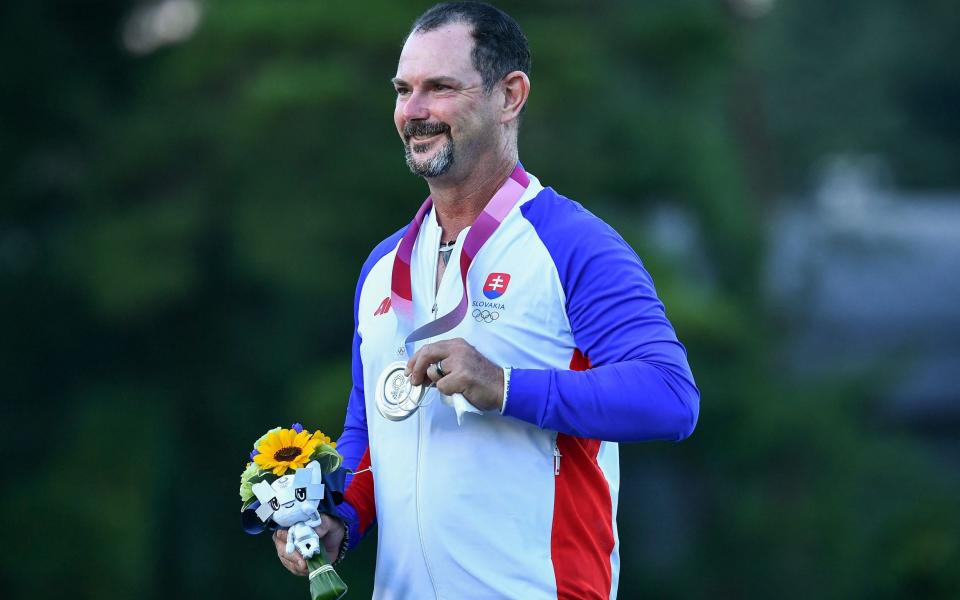Paul Casey and Rory McIlroy Olympic medal hopes slip away after bizarre seven-way golf play-off

Paul Casey and Rory McIlroy both saw their dreams of an Olympic medal agonisingly slip from their grasp in a bizarre seven-man play-off for bronze on a dramatic final day of the men’s golf tournament.
Since the sport returned in Rio after a 112-year gap, critics have castigated the authorities for not being more inventive with the format. Yet after a conclusion that featured America Xander Schauffele denying Rory Sabbatini his outrageous Slovakian mission and so reminded that the standard 72-hole strokeplay fare can still be eminently gripping, the game did indeed stride into virgin territory.
Never has it before witnessed a septet of millionaires fighting it out in sudden death for the honour of finishing third. This bunch would usually have been long gone on the private jets, but there they were at Kasumigaseki Country Club scrapping over the inferior piece of metal with no cheque attached. It is no exaggeration to say that the Olympic penny finally dropped for golf in this chaotic scene.
Unfortunately, the organisers resisted sending out the 15-under crowd in one delicious seven-ball, instead electing for a more traditional fourball and threesome. Their number also included the reigning Masters champion and home favourite in Hideki Matsuyama and the Open winner Collin Morikawa.
Casey and Matsuytama were the first to crack, meaning that Ireland’s McIlroy, American Morikawa, Chinese Taipei’s CT Pan, Chile’s Mito Pereira and Columbia’s Sebastian Munoz reformed as a cosmopolitan fiveball.
With the last three named all outside the world’s top 80, McIlroy and Morikawa were the obvious favourites, but golf is not like that - especially on days such as this - and McIlroy bowed out when failing to birdie the third extra hole. It was left to Morikawa and Pan with the player ranked 210th claiming the last place on the podium.

By that time, McIlroy was back in the clubhouse, confirming himself as an Olympic convert. Sceptical to the point of being deeply cynical when the sport was reincluded on the programme, the 32-year-old has undergone the golfing version of Dasmascus on his debut. “I've been proven wrong this week and I'm happy to say that,” McIlroy said. “I never tried so hard in my life to finish third.”
Casey concurred. "The golfers that passed on it, I've got no words for them,” the 44-year-old said. “All I would say is that I think representing your country is the greatest thing you can do."
Emotion overflowed throughout the leaderboard. For Schauffele this was a fine way in which to break a barren spell going back more than two and a half years. The 27-year-old has become a perennial major contender and now has an honour worthy of his talent. And as world No 5 the International Golf Federation, the keeper of golf’s flame, will be delighted to have a big name as successor to England’s Justin Rose.
The long-time leader looked to have cracked when he was in the trees on the 14th, playing his fourth shot on the par four. At that stage, Sabbatini had turned the event on its head by shooting a 10-under Olympic-record 61, coloured up with an eagle, 10 birdies and two bogeys for a 17-under total. But somehow Schauffele scrambled for a bogey, converted a six-footer for birdie on the 17th to regather the advantage and then made a tremendous up and down on the 18th for a 67 and 18-under.

Winning his country’s first golf gold since Charles Sands in 1900 clearly is a huge deal, although this was as much of a tale of family fulfillment. As a young decathlete Xander’s father, Stefan, was on track to represent Germany at Seoul in 1988. But he was involved in a crash when a driver - later discovered to be well over the limit - collided with his car head-on. Stefan underwent six eye surgeries over the next two years and his Olympic story was over.
Until Tokyo, 2020, that is.
Stefan, who emigrated to San Diego with Japanese wife Ping Yi before Xander was born, acts as his son’s mental and swinging coach and no longer has to view the Games through the prism of what-could-have-been.
“Man, it was stressful, because I wanted this for my dad more than anything,” Xander said. “I tried to represent my country, and then my family. It was really fun. And to have him here as well is really special. I gave dad a hug off the back of the green. I know this means a lot to him.”
Sabbatini’s winning tale would have been yet more fantastical. The ever controversial 45-year-old, who won the World Cup of Golf for South Africa alongside Trevor Immelman in 2003, changed his citizenship to Slovakia two years ago.
The lacklocked country in Central Europe is the home of his wife, Martini Stofanikova, who caddied for him in Tokyo and who also happens to be a cousin of the president of the Slovak Golf Association. Sabbatini was widely ridiculed for the switch - one American writer rechristened him “the boy from Bratislava '' - but he insisted it was not just so he could earn an Olympic place via the back door but to grow the game in a nation boasting just 30 courses.
And it was Sabbatini who had the last laugh, the former world No 8 belying a results sheet showing missed cuts in his last four events and a ranking now down at 204th, to frighten the living daylights out of some of the world’s best.
“The sole purpose of all this was to generate future generations of Slovak golfers,” the oldest player in the 60-strong field said. “It’s not exactly the prime sport over there for kids, but hopefully we can inspire future Olympians and future professionals. This can add some extra fuel on that fire.”

